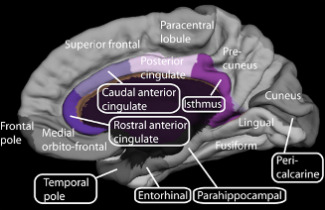Progressive reduction of brain area linked to the degree of involvement of Major Depression Disorder

The cingulate cortex, a brain area which plays an important role in moods, could diminish and deteriorate progessively as the degree of severity in major depression grows. This is the result of a study carried out by researchers at the Institute of Biomedical Research of Hospital de la Santa Creu i Sant Pau (IIB-Sant Pau) and the Port d'Informació Científica (PIC), which was recently presented at the 23rd European Congress of Neuropsychopharmacology.
The cingulate cortex is especially important in mood disorders and shows both structural and functional alterations in Major Depressive Disorder (MDD). However, so far little is known about the volumetric changes throughout the evolution of the disorder. That is why, as explained in the congress by Maria Serra, PIC predoctoral researcher and author of the work, scientists set out to explore this area of the brain at different stages of the disease.
The study was conducted with 59 patients aged 25-61, suffering from MDD - 20 with a first episode of depression, 19 remitted-recurrent-MDD and 20 chronic-MDD patients (with the onset of the current episode occuring over two years ago - and 20 control patients. In order to quantify cortical volumes magnetic resonance imaging (MRI) were obtained in two stages: segmentation of cortical surface and cortical fragmentation, in which a neuroatomical area is assigned to a specific cortical location.
Results showed that patients with MDD presented a decrease in the volume of the cingulate cortex with respect to control patients. This reduction also appeared to begin in the cingulate posterior area in the benign stage of the illness and moved towards a gradual spread in the more severe stages. This progressive reduction in volume contributes important information to what is already known about the involvement of cingulate cortex in MDD.
In her presentation, Maria Serra stressed the fact that the area, currently related to the persistence of symptoms in patients with a history of MDD, is the anterior cingulate cortex, considered one of the key areas of deep brain stimulation in more resistant MDD.
The research group was led by Maria Portella, postdoctoral researcher of the Research Group of Psychiatric Disorders IIB-Sant Pau. Participating in the study were researchers from this institute, a member of the Center for Biomedical Research in Mental Health Network, CIBERSAM and from Port d'Informació Científica, a UAB participant research center.
References
M. Serra, J. de Diego-Adeliño, Y. Vives, B. Gómez-Anson, P. Pires, D. Puigdemont, R. Pérez-Egea, V. Pérez, E. Álvarez, M.J. Portella. Cingulate cortex volumetric changes at different stages of major depressive disorder. Breaking news simposia S. 13. www.ecnp.eu. 30 August 2010.

